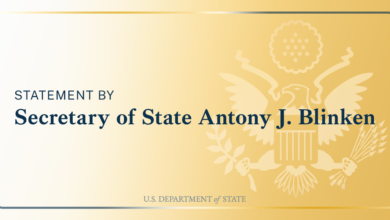North Korea blows up inter-Korean road, rail lines near border

SEOUL –
North Korea blew up sections of inter-Korean roads and rail lines on its side of the heavily fortified border between the two Koreas on Tuesday, prompting South Korea’s military to fire warning shots.
Pyongyang said last week it would cut off the inter-Korean roads and railways entirely and further fortify the areas on its side of the border as part of its push for a “two-state” system scrapping its longstanding goal of unification.
At around midday on Tuesday, some northern parts of road and rail lines connected to the South were destroyed, the South’s Joint Chiefs of Staff (JCS) said.
Seoul’s unification ministry, which handles cross-border affairs, condemned the incident as a clear violation of past inter-Korean agreements, calling it “highly abnormal.”
“It is deplorable that North Korea is repeatedly conducting such regressive behaviour,” ministry spokesperson Koo Byoung-sam told a briefing.
Tensions mounted after the North last week accused Seoul of sending drones over Pyongyang. North Korea said the drones scattered a “huge number” of anti-North leaflets, and Kim Yo Jong, leader Kim Jong Un’s powerful sister, warned on Tuesday that Seoul would “pay a dear price.”
South Korea’s government has declined to say whether the South Korean military or civilians had flown the alleged drones.
The two Koreas have also clashed over balloons of trash floated since May from North Korea. Pyongyang has said the launches are a response to balloons sent by anti-regime activists in the South.
After Tuesday’s demolitions, video released by the South’s military showed an explosion and a plume of smoke rising above an area of road where the North had put up a black barrier.
It also showed several dump trucks and earth-movers approaching with a group of North Korean military officials observing and guiding the vehicles.
In response to the blasts, the South’s military fired warning shots south of the military demarcation line, although there was no damage on Seoul’s side of the border, it said.
Old signs of reconciliation
Pyongyang has been taking steps to sever inter-Korean ties, redefining the South as a separate, hostile enemy state, since Kim Jong Un declared it a “primary foe” early this year and said unification was no longer possible.
The two Koreas are still technically at war after their 1950-53 war ended in an armistice, not a peace treaty.
The cross-border roads and railways are remnants of rapprochement that included a 2018 summit. Seoul has funneled more than US$132 million into rebuilding the links in the form of cheap loans to Pyongyang, unification ministry data showed.
“It was a major inter-Korean cooperation project that was carried out upon the request from the North,” said ministry spokesperson Koo, adding Pyongyang was still obliged to repay the loans.
In 2020, the North blew up a joint liaison office set up in a border town after nuclear talks with the United States collapsed.
South Korea filed a lawsuit in 2023 against the North, seeking damages of around 45 billion won (US$33 million) from the joint office’s demolition.
Chinese foreign ministry spokesperson Mao Ning told a press briefing that Beijing was concerned about developments and wanted “to avoid further escalation of the conflict.”
The government of South Korea’s Gyeonggi Province bordering the North said on Tuesday a special police force would be brought in to crack down on the practice of flying anti-North Korea leaflets from some border areas.
South Korea’s constitutional court overturned a ban on such launches last year.
Proponents say leaflet campaigns should be respected as freedom of speech but critics and some lawmakers say police should block them if they threaten lives and safety.
(Reporting by Hyunsu Yim and Hyonhee Shin; Additional reporting by Laurie Chen in Beijing; Editing by Ed Davies, Timothy Heritage and Ros Russell)




